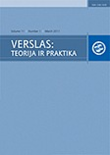Competence Model for Measuring Career Development and Organisational Growth in the Health Sector
Competence Model for Measuring Career Development and Organisational Growth in the Health Sector
Author(s): Anthonia Adenike Adeniji, Omotayo Adewale Osibanjo, Odunayo Paul Salau, Hezekiah O. Falola, Ebegbuki Igbinoba, Folakemi Ohunakin, Opeyemi OgueyungboSubject(s): Business Economy / Management, Micro-Economics, Health and medicine and law, Human Resources in Economy
Published by: Vilnius Gediminas Technical University
Keywords: career development; organisational growth; skills; promotion; efficiency; satisfaction;
Summary/Abstract: The present changing trend and competitive business world have compelled many sectors to improve their service quality, productivity and performance. The health sector is a unique sector with peculiar work environment and developmental expectations from workers of different categories. Experts indicate that the Nigeria health sector budget is not impressive as it has never moved closer to World Health Organization template of 15% of the annual budget allocated to the health sector. Arising from this gross underfunding, the health sector has become weak while infrastructure and logistic supports seem to be obsolete with defective career initiative programmes. Hence, the present study assessed a competence model for measuring career development and growth of the health sector in Nigeria. The descriptive research design was adopted using stratifiedrandom sampling technique with a mixed method (specifically, sequential explanatory method) approach for gathering data from the selected teaching hospitals. Six dimensions and 30 item statements of career development and organizational growth have been adopted from previous studies. The use of a structured questionnaire was employed and completely filled by 377 staff and management of the selected tertiary institutions. Data collected through the copies of questionnaire were analysed through measurement and structural models (SEM_PLS3); while interview data were codified and themes extracted. The results of the statistical analysis reveal that organizational growth significantly depends not only on the formulation and implementation of career development programmes but also on monitoring. The findings of this research have explicit implications for both the employees and the organizations. This study suggests that management will need to provide interventions and be more active in carefully implementing career management plans that will meet individual and organizational goals.
Journal: Verslas: teorija ir praktika
- Issue Year: 20/2019
- Issue No: 1
- Page Range: 248-258
- Page Count: 11
- Language: English

